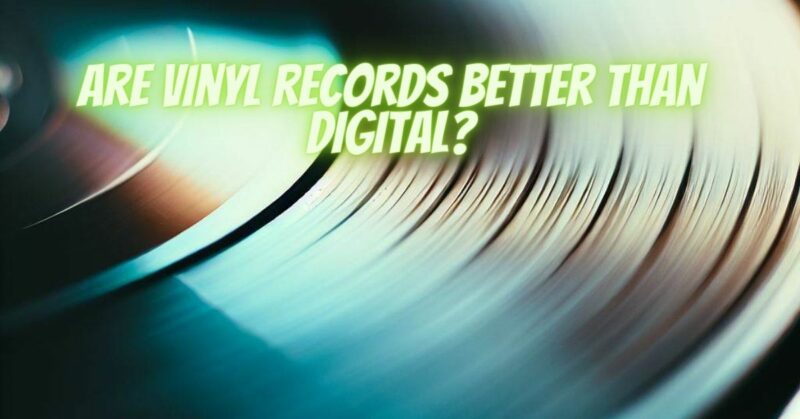In an age dominated by digital technology and streaming services, the resurgence of vinyl records has sparked a fascinating conversation about the merits of analog versus digital audio. The debate over whether vinyl records are superior to digital formats delves into various aspects of sound quality, aesthetics, and the overall listening experience. Let’s explore the arguments on both sides of this discussion to understand whether vinyl truly outshines digital or if it’s a matter of personal preference.
Sound Quality
Vinyl Records: Proponents of vinyl records often praise the warm, organic sound they produce. The analog nature of the medium introduces subtle imperfections and a natural dynamic range that can contribute to a rich and immersive listening experience. Vinyl enthusiasts appreciate the “vinyl warmth” that can make music feel more authentic and intimate.
Digital Audio: Advancements in digital audio technology have led to high-resolution formats that offer exceptional sound quality. Lossless digital formats like FLAC (Free Lossless Audio Codec) can capture audio with precision and accuracy, providing a cleaner sound without the inherent limitations and surface noise associated with vinyl records.
Tangibility and Aesthetics
Vinyl Records: Vinyl records are cherished not only for their sonic qualities but also for their physicality. The larger album covers, intricate artwork, and lyric sheets contribute to a multisensory experience that connects the listener to the music on a deeper level. The ritual of handling records, setting up a turntable, and gently placing the needle can be a nostalgic and gratifying process.
Digital Audio: Digital formats prioritize convenience and portability. Streaming platforms grant listeners instant access to vast music libraries from anywhere with an internet connection. However, the digital experience lacks the tangible and tactile engagement that vinyl records offer.
Collectibility and Value
Vinyl Records: Collectors often gravitate toward vinyl records due to their historical significance and scarcity. Limited editions, rare pressings, and vintage releases can hold considerable value in the collector’s market. The hunt for sought-after records adds an element of excitement and discovery to the hobby.
Digital Audio: Digital formats do not possess the same aura of collectibility as vinyl records. However, digital music has its own advantages, such as the ability to store vast collections on devices or in the cloud, ensuring easy access without the need for physical storage space.
Authenticity and Nostalgia
Vinyl Records: Vinyl records evoke a sense of nostalgia for those who grew up with the format. The crackling of a record and the imperfections inherent in analog playback can transport listeners to an earlier era of music consumption, evoking fond memories and emotions associated with vinyl.
Digital Audio: While digital formats lack the historical context of vinyl, they offer the advantage of convenience and versatility. Digital music can be easily manipulated and shared, and listeners can curate playlists that span genres and eras with a few clicks.
The debate over whether vinyl records are better than digital audio is not one that can be definitively settled, as it largely depends on individual preferences and priorities. Vinyl records offer a tactile, immersive experience that appeals to those who value authenticity, nostalgia, and aesthetics. On the other hand, digital audio provides unparalleled convenience and sound quality, making vast music collections easily accessible on various devices.
In truth, both formats have their strengths and weaknesses. Some listeners appreciate the intimacy and ritual of vinyl records, while others gravitate toward the ease of digital streaming. Ultimately, the decision between vinyl and digital boils down to how one values sound quality, aesthetics, tangibility, and the overall listening experience. Embracing either format can lead to a richer appreciation of music in all its diverse forms.


